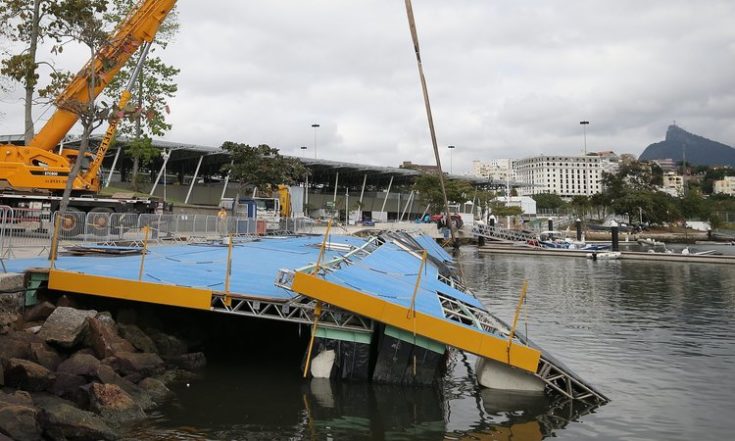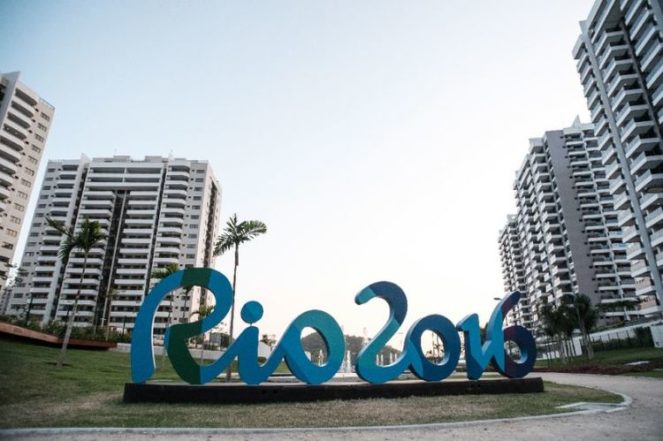
They can’t say they weren’t warned.
In 2011, the International Olympic Committee (IOC) advised organizers of the 2016 Summer Games, which officially kick off tonight in Rio de Janeiro, to beware. The IOC’s concern? According to documents recently obtained by Reuters via the Freedom of Information Act, the public-private partnership (P3) contracts executed to finance and construct key facilities for Brazil’s 17-day turn on the world stage also appeared to incentivize developers and builders to cut corners to meet deadlines.
Of course, more than 100 Russian athletes, among others, have been banned from competing this year for ethical corner-cutting. But at least their cheating has not created hazardous conditions. The same cannot be said for the new Olympic Village, which “opened” last week to wide criticism.
All told, nearly 57% of the $12.3 billion required to build venues for the Rio Olympics derived from P3s, with private firms receiving rights to develop the sites in exchange for bankrolling the projects. Alternatively, developers can maintain ownership of facilities, as they will with the $880-million Olympic Village, with the intent of selling them as luxury housing once the Games conclude.
- To read more about the Rio Games’ construction woes, click here.
Although the approach unburdened the state and city of Rio de Janeiro of billions of in spending, conditions at the Olympic Village were met with a hailstorm of criticism in late July as the first of the Olympic teams arrived there to set up residence in preparation for the games. The Australian contingent checked in, then checked out, characterizing their accommodations as “uninhabitable,” citing “blocked toilets, leaking pipes, exposed wiring, and darkened stairwells where no lighting has been installed, and dirty floors in need of massive cleaning.”

The Village is one of seemingly countless Olympic projects beset by problems of quality and delays. It has drawn extra scrutiny because it is the largest Olympic complex of its kind ever constructed.
A “stress test” performed by the Australians that involved running taps and flushing toilets on several floors simultaneously resulted in “water coming down walls, a strong smell of gas in some apartments and there was a ‘shorting in the electrical wiring’,” said Kitty Chiller, a retired former pentathlete and Australia’s Chef de Mission. Earlier this week, she told reporters. “This is my fifth Games and I’ve never seen this lack of readiness at this point in time.”
“There was water coming down walls, a strong smell of gas in some apartments and… a ‘shorting’ in the electrical wiring”
Three separate sources told Reuters that the event’s organizing committee, Rio 2016, indicated that financial problems prevented proper oversight of Olympic projects, triggering concern among committee members over the quality of construction, which IOC had voiced five years ago.
IOC documents advised Olympic planners that they would need to closely supervise construction activity to ensure that developers balanced their commercial interests with workmanship that met high standards and was completed on schedule. “The city recognizes the PPP contractor most likely has two objectives, maximize land value and deliver venue obligations at the least cost,” according to an IOC assessment of Rio’s plan. “The city must be diligent in making sure the Games’ obligations are fully met.”

One Olympic organizer told reporters that timing had also contributed to the mess. The complex was handed over to event officials at the end of May, before water and electricity were finished. “The main problem for the delay was that water and electricity were connected too late,” he told reporters.
Heads above water?
This week, some 600 plumbers and electricians were scrambling to execute all the repairs needed in the village. On national television, one local contractor said it had encountered problems in 57 of the 272 apartments its was assigned, including lack of power and waterless showers. According to The Guardian newspaper, 19 of the village’s 31 towers had yet to pass final checks.
Although Australians have since resumed residency in the Village, housing problems remained widespread as late as July 28, with the Argentine Olympic Committee complaining that two of its five floors were uninhabitable and the Belarus team publishing photos of blocked drains on its official page. Reports also indicated Egyptian athletes were housed in rooms with no hot water and non-functioning toilets. According to the Washington Post, one Kenyan athlete wrote, “Please fix my toilet,” on a notice board in the Olympic Village.

Meantime, crews were scrambling to make repairs to the main ramp of the Marina de Gloria, an Olympics sailing venue that partially collapsed on July 31, raising additional concerns about the quality of structures built for the Olympics. Repairs to the ramp, the main access point for boats to water, were due for completion this week, in time for sailing competitions that will begin Aug. 8.
Following results of a 16-month study by Associated Press that found Rio’s water teaming with bacteria, viruses and raw human sewage, biomedical expert Valerie Harwood warned the 1,400 athletes involved in water-related competitions, “Don’t put your head under water.”
Ok. Thanks. (gulp!)
The horrid conditions, in part, are the result of promises unfulfilled since Rio was awarded the Olympics in 2009, beating out Chicago and Tokyo. In particular, the city had promised to clean up two bodies of water in which rowers and canoers would compete — Guanabara Bay and Rodrigo de Freitas Lagoon. Both had figured prominently during IOC negotiations, the idea being to leave a legacy of rejuvenated waters for generations to come. Now, future generations will have decidedly different memories.
With opening ceremonies upon us, the true achievements of the next 17 days, and Rio’s role in succeeding — or not — amid the glare of global scrutiny, will only grow more apparent over time.
For now, let the Games begin.



Discussion
Be the first to leave a comment.
You must be a member of the BuiltWorlds community to join the discussion.